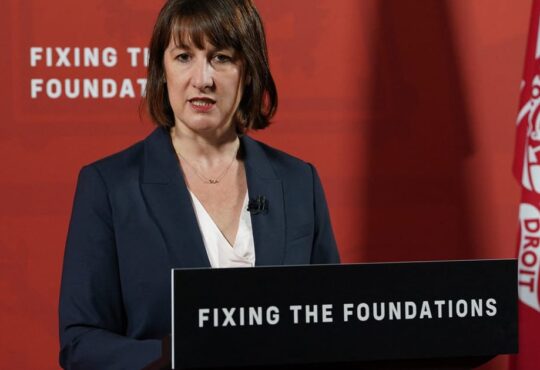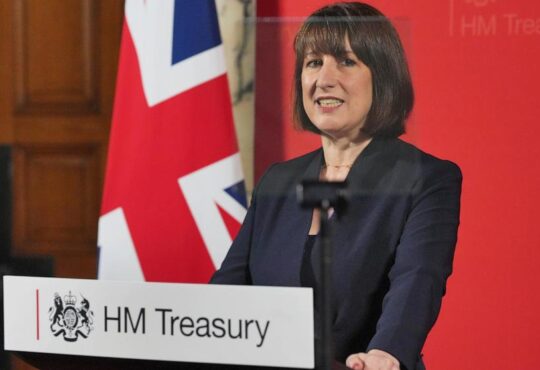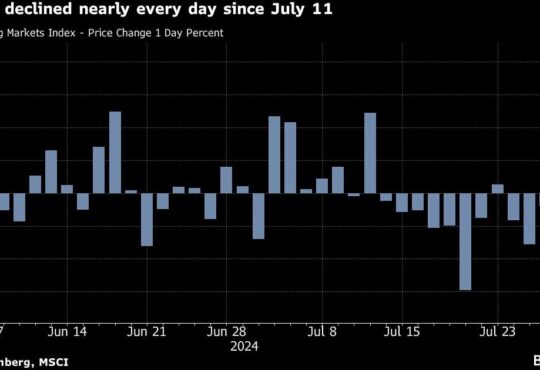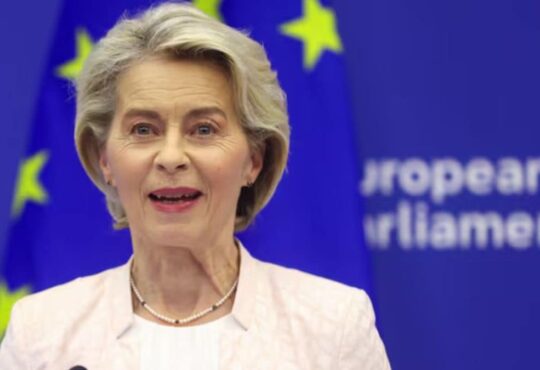
Press play to listen to this article
Voiced by artificial intelligence.
PARIS — As the EU’s top official in charge of industrial affairs, Thierry Breton has often brought up his past as a tech CEO to show how he’s particularly well-suited for the job.
But now that Atos, the French tech company he led before joining the European Commission, is in the midst of collapsing and being sold off for parts, that private-sector track record is starting to look more like a liability than an asset for the Frenchman who’s made no secret of his political ambitions.
Atos, which Breton ran from 2008 to 2019, was once a shining jewel in France’s tech ecosystem, a product of successive mergers that grew into a multinational IT services firm valued at around €5 billion. But it’s run into trouble over the last few years, with its valuation plunging to around €500 million and some of the firm’s core divisions due to be sold off to Daniel Křetínský, a Czech entrepreneur.
The company’s woes have become a political hot potato in France, where conservative senators from the Les Républicains party have put forward the idea of a commission of inquiry to dig into the reasons behind the firm’s collapse. Meanwhile, other lawmakers have said Atos should be nationalized — partly due to sensitive national security interests at play. The company’s supercomputer operations are used in nuclear test simulations and deterrence.
With Atos’ troubles generating headlines in France, Breton has pushed back against suggestions that he’s responsible for the firm’s problems.
Breton, currently the EU’s internal market commissioner, has expressed openness to becoming the next head of the European Commission. While he remained coy on his potential bid to head the list for French President Emmanuel Macron’s Renaissance party in the upcoming European Parliament election, Breton’s increased presence in Paris leaves many in French political circles thinking he is indeed campaigning for that.
While refusing to comment on the current state of the company, Breton spoke on the program of Le Grand Jury on October 29 on the situation of Atos at the time he left: “It was the European No. 1 in cybersecurity, supercomputers, cloud — and no debt.”
Yet his successors at Atos lay the blame for its spiraling problems at the EU industry czar’s feet.
“The success of Atos’ stock price in the 2010s,” when Breton was CEO, “was in reality the result of an acquisition policy and strong external growth which was achieved with questionable or insufficient selectivity and the signing of contracts whose remuneration was too low in relation to costs,” Bertrand Meunier, Breton’s successor as CEO of Atos, told La Tribune business daily in September.
Meanwhile, some Atos shareholders have filed complaints with France’s financial crimes prosecutor, the PNF, targeting Meunier over his handling of the sale. This has raised the prospect of a protracted legal battle over the company’s past and present management just months before the EU election.

Asked for more details, a spokesperson for the PNF confirmed the complaints but declined to comment to avoid the matter being “instrumentalized” by private interests.
Atos declined to comment when the complaints were filed in late September and early October, but later said Meunier had led the company “with integrity and responsibility.” Meunier left his position in mid-November.
Thorn in his side
As members of Breton’s Renaissance political party jostle over who will become its lead candidate, some party heavyweights are — discreetly — bringing up Atos as a problem for Breton’s viability.
“Breton is not a good idea. With Atos, there’s a lot of bullets that will be fired at him,” said a prominent member in French parliament for Macron’s party, who like others was granted anonymity to discuss nonpublic deliberations over the candidacy.
Others point out that those bringing up the company are mostly internal rivals.
“Obviously, this is not meant to help him,” said a centrist French senator.
The Frenchman isn’t alone in the race to lead Macron’s electoral list. Stéphane Séjourné, who leads the Renew Europe group in the European Parliament, is a potential front-runner, though Macron isn’t expected to announce a decision until January.
The person who gets the position will also receive an advantage in becoming the party’s nominee to replace Ursula von der Leyen as Commission president, should she not be given a second term.
But Renaissance has to choose a candidate that’s fit to face Jordan Bardella, head of the far-right National Rally party, who will be leading his group into the elections.
While the name Thierry Breton carries a lot of weight in Brussels, several party officials are skeptical about his campaign chops and his ability to appeal to ordinary citizens in his home country. His first (and only) electoral campaign was in the late 1980s.
“Whoever will lead the Renaissance list has to be prepared to be stripped bare. You have to face this sudden, ephemeral, brutal exposure,” said a Renaissance official, likewise granted anonymity.
A member of French parliament from Macron’s majority also fears that Bardella could weaponize information revealed by the press. In October, the satirical weekly newspaper Le Canard enchaîné disclosed that Breton left Atos with a yearly pension of €711,000. Breton also sold his shares when he became commissioner, for an estimated €40 million before tax, in order to avoid conflicts of interest.
EUROPEAN PARLIAMENT ELECTION POLL OF POLLS
For more polling data from across Europe visit POLITICO Poll of Polls.
“These retirement rights, subject to demanding performance criteria, have all been approved at the general meeting of shareholders, year after year,” said a Breton spokesman.
On the offensive
An official from the European Commission added that the Atos problems was a “stain on Breton’s career.”
But Breton’s supporters are fighting back.
“If Atos is a strategic player today, it’s thanks to the transformation carried out by Thierry Breton over 10 years, without adding debt,” said a member of the commissioner’s inner circle. “Those whose only experience in business is limited to an observation internship in 9th grade would do better to refrain from commenting on the performance of captains of industry.”
Five former members of the Atos executive committee also published an op-ed defending Breton’s leadership as CEO of Atos against “falsehoods,” adding that “Atos has benefited from 11 years of managerial stability” with Thierry Breton.
Breton increasingly looks to be campaigning, projecting himself as central to the Commission’s entire agenda. MEPs in Strasbourg received copies of a glossy booklet with his face on the cover, titled the “A-Z of Strategic Autonomics.” From ammunition to Zeitenwende, it outlines the Commission’s efforts to become a geopolitical powerhouse, with photos of Breton in power poses on 12 of the 28 pages.
The A to Z includes G for gigabit, V for vaccines and Y for yes (I do), the latter an homage to the enduring Franco-German alliance. Published by the Commission’s printing office, the budget was a mere two digits, a Breton spokesperson said.
In the end, the choice as to Breton’s future will likely rest in Macron’s hands — and it remains unclear if Atos’ difficulties will weigh heavily in his decision.
“This is not the kind of business that stops Macron,” said a member of the French government who viewed Breton’s potential candidacy favorably.
Elisa Braun and Sarah Wheaton contributed reporting.






